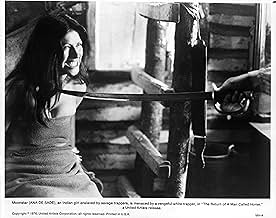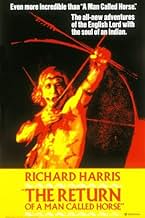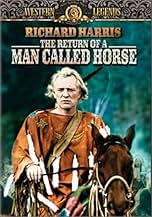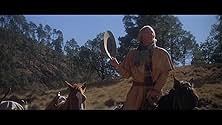Der Mann, den sie Pferd nannten - 2. Teil
Originaltitel: The Return of a Man Called Horse
IMDb-BEWERTUNG
6,1/10
2169
IHRE BEWERTUNG
Füge eine Handlung in deiner Sprache hinzuThe English gentleman known as Horse, returns to the American west to save his adopted Indian tribe from extinction.The English gentleman known as Horse, returns to the American west to save his adopted Indian tribe from extinction.The English gentleman known as Horse, returns to the American west to save his adopted Indian tribe from extinction.
- Regie
- Drehbuch
- Hauptbesetzung
William Lucking
- Tom Gryce
- (as Bill Lucking)
Claudio Brook
- Chemin De Fer
- (as Claudio Brooke)
Pedro Damián
- Standing Bear
- (as Pedro Damian)
Humberto López
- Thin Dog
- (as Humberto Lopez)
Susan Dury
- Lord John's fiancee
- (Nicht genannt)
Rigobert Rico
- Owl
- (Nicht genannt)
Empfohlene Bewertungen
This is a weak sequel: it lacks the interest and light touch of the magnificent "Man Called Horse" in nearly every aspect and when compared to each other they hardly seem to be the same genre.
The Return is almost a parody of the first and tries to evoke different Indian ceremonies but comes across as trying way too hard to bottle the magic of the first. In this film the tribe is lost and abandoned, having lost their homelands, modern life has encroached on paradise and they are living in abject misery and poverty. Perhaps this is the point: the first film took us to a place where we would want to be, a simpler time. This takes us to broken Indians in a miserable world and the White Man is the hero and savior which rather negates the whole idea of the film.
The beauty of the first lay in the fact that the white man learnt and discovered that real civilization lies in values rather than western materialism. In the second film this is all but lacking and so we end up with a weak film.
A huge disappointment.
The Return is almost a parody of the first and tries to evoke different Indian ceremonies but comes across as trying way too hard to bottle the magic of the first. In this film the tribe is lost and abandoned, having lost their homelands, modern life has encroached on paradise and they are living in abject misery and poverty. Perhaps this is the point: the first film took us to a place where we would want to be, a simpler time. This takes us to broken Indians in a miserable world and the White Man is the hero and savior which rather negates the whole idea of the film.
The beauty of the first lay in the fact that the white man learnt and discovered that real civilization lies in values rather than western materialism. In the second film this is all but lacking and so we end up with a weak film.
A huge disappointment.
The English gentleman known as Horse (Richard Harris), returns to the American west to save his adopted Indian tribe from extinction.
According to Roger Ebert, "The film reveals its basic white-chauvinist bias, but it certainly seems to take itself seriously. It's of average length, but paced like an epic. There are four main movements in the plot: Return, Reconciliation, Revenge and Rebirth. If this seems a little thin for a two-hour movie, believe me, it is, even with all that portentous music trying to make it seem momentous." The film as a whole is not remarkable. Allegedly this is the film that convinced George Lucas to hire the director for "Empire Strikes Back", arguably the best of the "Star Wars" franchise. But this movie, I don't know... aside from the race issues (a white man intervening t save the Indians, and the Indians being played almost entirely by whooping, stereotypical white actors) it is just a bland movie. Even by sequel standards. Richard Harris is great, but he can't save this one.
According to Roger Ebert, "The film reveals its basic white-chauvinist bias, but it certainly seems to take itself seriously. It's of average length, but paced like an epic. There are four main movements in the plot: Return, Reconciliation, Revenge and Rebirth. If this seems a little thin for a two-hour movie, believe me, it is, even with all that portentous music trying to make it seem momentous." The film as a whole is not remarkable. Allegedly this is the film that convinced George Lucas to hire the director for "Empire Strikes Back", arguably the best of the "Star Wars" franchise. But this movie, I don't know... aside from the race issues (a white man intervening t save the Indians, and the Indians being played almost entirely by whooping, stereotypical white actors) it is just a bland movie. Even by sequel standards. Richard Harris is great, but he can't save this one.
I loved the movie,because it showed the beautiful people,that the American Indians are. They are really, very spiritual people. I lived with a family (who did the dance),for about 4 months and it was by far the most interesting period of my life,so far. I learned a lot from this Wonderful family,I could go on. But my point that I want to make,is I understand why the Richard Harris character returned to help his old family. I have experienced many of the ways of the Indians in modern society. Seeing an Eagle fly,now makes me touch my heart with the knowledge of what it signifies.Their spirituality will touch your heart,IF you let it in.
Enjoyable and entertaining sequel to ¨A man called Horse¨ . The English gentleman known as Horse, returns to the American west to save his adopted Indian tribe from extinction . As the Britisher aristocrat abandons his formal ways and returns the Sioux territory , in the Dakotas , and discovers again is own strength . As he passes their torture tests , and he is again embraced by the tribe . And again the ¨Sun Vow¨scene where our ex-aristocrat is suspended by horsehair ropes from bones inserted into holes made in his chest by eagle claws before they will accept him .
This exciting picture packs thrills , chills , marvelous outdoors and more of the torture scenes for which this series is notorious . The picture contains a deep critical on the inevitable contempt that ignorance of different cultures engenders as well as anthropological differences . This is a very gripping and realistic portrayal of American Indian way of life and many critics considered to be better than its precedessor . Interesting screenplay by Jack DeWitt who wrote also the original plot , based on a 1958 segment of the TV series ¨Wagon Train¨ 1957 , bearing the same title , The Man called Horse, it is the same story as this movie, with a few changes, even chief with two sisters, and a slave to Yellow Rope's mother . Furthermore , the story is based on Cabeza de Vaca's real life , a soldier from Spain that in 1528 suffered all that happens in this movie.
Richard Harris is excellent , as always , at one of his mightiest box office hits . He is in terrific form as the Britisher nobleman who returns along with his Indians friends . Gale Sondergaard , replacing Judith Anderson , provides a strong acting . In addition , a fine support cast such as William Lucking , Geoffrey Lewis and Mexican actors as Jorge Luke , Claudio Brook , Enrique Lucero , all of them ordinaries in Indian roles . It displays rousing and powerful musical score by Laurence Rosenthal at his best . Colorful as well as evocative cinematography by Owen Roizman , including impressive landscapes . The motion picture was very good directed by Irvin Kershner . Due to George Lucas found to be a very attractive sequel , he hired Irvin Kershner to shoot another awesome follow-up : "The empire strikes again" .
The original version ¨The man called Horse¨ is the best , starred by Harris , Judith Anderson , Iron Eyes Cody , Dub Taylor , James Gammon and directed by Elliot Silverstein ; it deals with Harris who fall into the clutches of a tribe of Sioux ¨Yellow Hands¨ Indians and they proceed to inflict torture by ritual ; it remains a riveting variation of ¨the man living wild¨ issue . Sequelled by a third part titled ¨The triumphs of a man called Horse¨ (1983) an inferior and inadequate following dealing with Horse's son who have to save his people from prospectors in order to keep his title as Chief ; being realized by John Hough with Michael Beck , Anna De Sade , Simon Andreu , but not much Richard Harris .
This exciting picture packs thrills , chills , marvelous outdoors and more of the torture scenes for which this series is notorious . The picture contains a deep critical on the inevitable contempt that ignorance of different cultures engenders as well as anthropological differences . This is a very gripping and realistic portrayal of American Indian way of life and many critics considered to be better than its precedessor . Interesting screenplay by Jack DeWitt who wrote also the original plot , based on a 1958 segment of the TV series ¨Wagon Train¨ 1957 , bearing the same title , The Man called Horse, it is the same story as this movie, with a few changes, even chief with two sisters, and a slave to Yellow Rope's mother . Furthermore , the story is based on Cabeza de Vaca's real life , a soldier from Spain that in 1528 suffered all that happens in this movie.
Richard Harris is excellent , as always , at one of his mightiest box office hits . He is in terrific form as the Britisher nobleman who returns along with his Indians friends . Gale Sondergaard , replacing Judith Anderson , provides a strong acting . In addition , a fine support cast such as William Lucking , Geoffrey Lewis and Mexican actors as Jorge Luke , Claudio Brook , Enrique Lucero , all of them ordinaries in Indian roles . It displays rousing and powerful musical score by Laurence Rosenthal at his best . Colorful as well as evocative cinematography by Owen Roizman , including impressive landscapes . The motion picture was very good directed by Irvin Kershner . Due to George Lucas found to be a very attractive sequel , he hired Irvin Kershner to shoot another awesome follow-up : "The empire strikes again" .
The original version ¨The man called Horse¨ is the best , starred by Harris , Judith Anderson , Iron Eyes Cody , Dub Taylor , James Gammon and directed by Elliot Silverstein ; it deals with Harris who fall into the clutches of a tribe of Sioux ¨Yellow Hands¨ Indians and they proceed to inflict torture by ritual ; it remains a riveting variation of ¨the man living wild¨ issue . Sequelled by a third part titled ¨The triumphs of a man called Horse¨ (1983) an inferior and inadequate following dealing with Horse's son who have to save his people from prospectors in order to keep his title as Chief ; being realized by John Hough with Michael Beck , Anna De Sade , Simon Andreu , but not much Richard Harris .
The first sequel to A Man Called Horse {there was another one a few years later which turned out to be something of a disappointment} is a much more conventional adventure movie. This does not mean it's bad,not at all,in fact it's probably more enjoyable. There's more English language dialogue,The Sioux dialogue is subtitled instead of just being incomprehensible to those who don't know Sioux,and it follows a familiar action movie structure and scenario. It just lacks the originality and edge of the original,where we were exploring an unfamiliar culture and weren't sure all the time if we liked everything about it. Disappontingly,none of the Sioux in the first film appear to return.
Well directed by Irvin Kershner,generally a journeyman director who occasionally excelled himself {i.e.The Empire Strikes Back},it has a fantastic cut early on from violence in the wild west to fox hunting in England,a different kind of savagery. The early scenes do a really good job of showing the film's hero,again well played by Richard Harris,as a man who appears to have everything-a title,a big house,a wife,etc} but inside is empty because he was only truly himself when he was with the Sioux. The first half of the film is leisurely,and has a re-run of the Sun Vow ritual of the first film,but longer and more graphic. But it's essential to the film,especially the vision Harris has of meeting himself as an old man.
The film's second half is mostly conventional if well staged action fare,although Harris looks out of place riding with the Sioux in western clothes-surely he would have dressed like one of them? Laurence Rosenthal's soaring score is wonderful and,in contrast with the more authentic sounding music of the first film,is more evidence that the filmmakers were generally going for a more romanticised approach. On that level,this sometimes rousing follow up works well.
Well directed by Irvin Kershner,generally a journeyman director who occasionally excelled himself {i.e.The Empire Strikes Back},it has a fantastic cut early on from violence in the wild west to fox hunting in England,a different kind of savagery. The early scenes do a really good job of showing the film's hero,again well played by Richard Harris,as a man who appears to have everything-a title,a big house,a wife,etc} but inside is empty because he was only truly himself when he was with the Sioux. The first half of the film is leisurely,and has a re-run of the Sun Vow ritual of the first film,but longer and more graphic. But it's essential to the film,especially the vision Harris has of meeting himself as an old man.
The film's second half is mostly conventional if well staged action fare,although Harris looks out of place riding with the Sioux in western clothes-surely he would have dressed like one of them? Laurence Rosenthal's soaring score is wonderful and,in contrast with the more authentic sounding music of the first film,is more evidence that the filmmakers were generally going for a more romanticised approach. On that level,this sometimes rousing follow up works well.
Wusstest du schon
- WissenswertesOn account of this film, which George Lucas found to be better than its predecessor, he hired Irvin Kershner to direct Star Wars: Episode V - Das Imperium schlägt zurück (1980).
- PatzerDuring the sun ceremony, John Morgan (Richard Harris) didn't have any scarring from the first time he underwent the ritual from five years earlier in the original film "A Man Called Horse".
- Alternative VersionenGerman VHS version was cut in the scene where Harris makes a fire on the man who followed him.
- VerbindungenFollowed by Triumph des Mannes, den sie Pferd nannten (1983)
Top-Auswahl
Melde dich zum Bewerten an und greife auf die Watchlist für personalisierte Empfehlungen zu.
Details
- Erscheinungsdatum
- Herkunftsländer
- Sprache
- Auch bekannt als
- El regreso de un hombre llamado Caballo
- Drehorte
- Produktionsfirmen
- Weitere beteiligte Unternehmen bei IMDbPro anzeigen
Box Office
- Budget
- 4.000.000 $ (geschätzt)
- Laufzeit2 Stunden 9 Minuten
- Farbe
- Seitenverhältnis
- 2.39 : 1
Zu dieser Seite beitragen
Bearbeitung vorschlagen oder fehlenden Inhalt hinzufügen





















